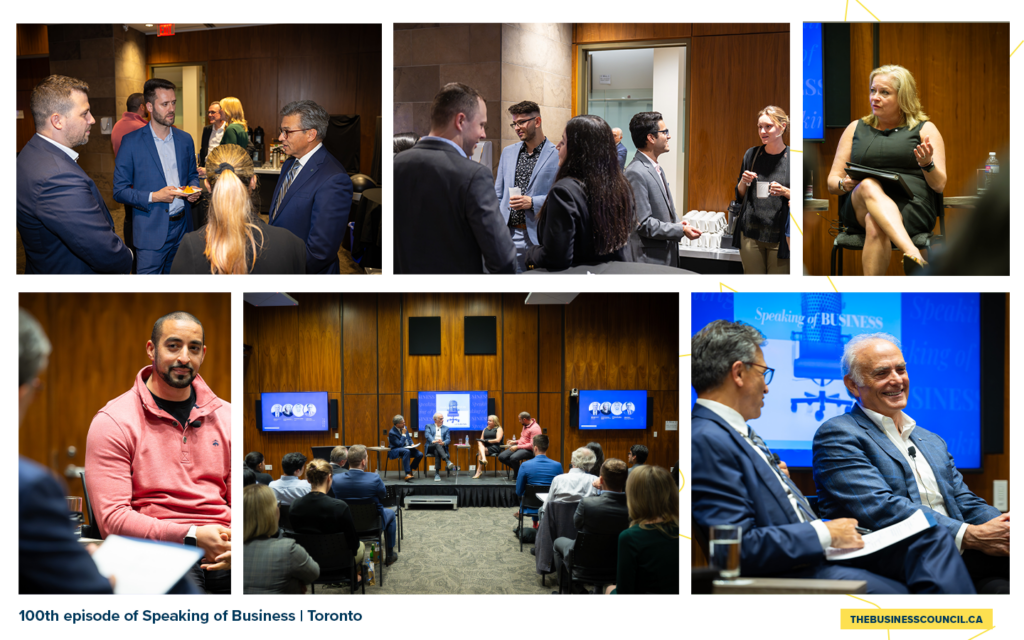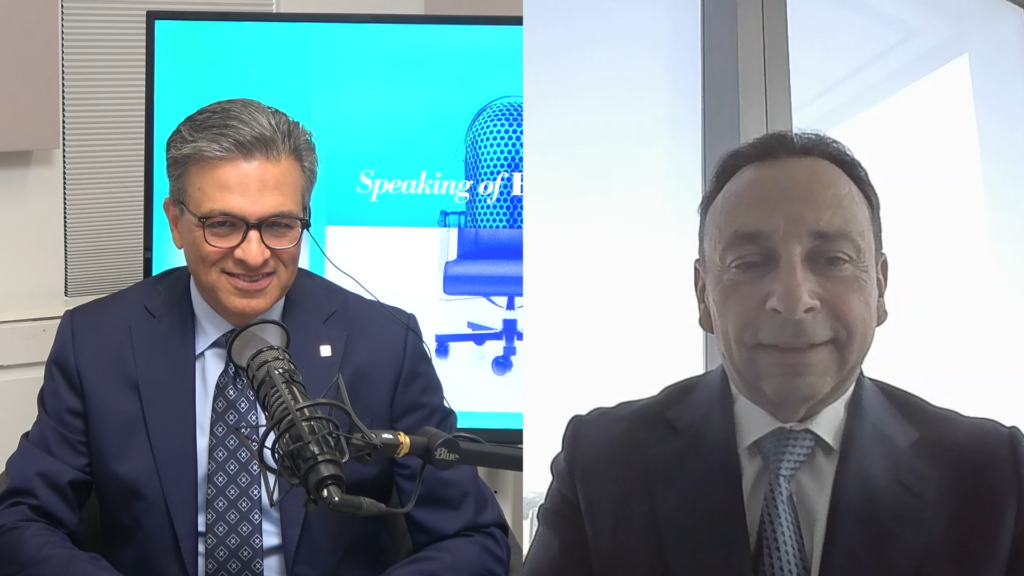Keeping afloat. Dennis Darby of Canadian Manufacturers and Exporters talks about what manufacturers need to help them weather the COVID-19 crisis, and why consistent rules across the country will be key to business recovery.
In light of the COVID-19 emergency, we’ve temporarily suspended our regularly scheduled series of conversations with Canadian CEOs. But we’re not going away. Instead, we’re going to pivot to the health emergency itself. We’re going to explore the impact on companies and workers across the country. And we’re going to find out how business leaders are responding to crisis.
Goldy Hyder:
Welcome to Speaking of Business. I’m Goldy Hyder, of the Business Council of Canada. In this special podcast series, we’re speaking with business leaders about the COVID-19 pandemic, how is it affecting them and how are they responding? Over the past few weeks, businesses have shut down, supply chains have been disrupted and borders have closed. It’s all, of course, in an effort to stop the spread of the virus. But it is taking its toll. Dennis Darby has seen the impact of the economic shutdown. As President and CEO of Canadian Manufacturers and Exporters, he represents 2,500 manufacturers across the country. Dennis, welcome to the podcast.
Dennis Darby:
Good day Goldy, nice to talk to you.
Goldy Hyder:
Well, let’s just jump right into it. You and I are both responsible for a membership-based organizations so we spent a lot of time talking to our members, a large part of the economy. I’m wondering what impact is this current crisis having specific to your membership which is so heavily reliant on the supply chain.
Dennis Darby:
Thank you for asking and, really, it’s a bit of a mixed bag because we have small manufacturers, small and medium-sized manufacturers and many large manufacturers. It really depends on where they are in terms of what sector of manufacturing and sometimes actually where they are physically located. But it has clearly been a challenge for everybody.
Goldy Hyder:
What are you hearing the most? What’s the biggest challenge? I know there’s lots of them, but what are you hearing the most?
Dennis Darby:
So one thing, early days, and it’s still an issue today: cash-flow, capital. Small and medium size companies just don’t have the money to be able to sustain this prolonged period with lower customer orders, high levels of absenteeism, not being able to get their products to market or get their parts in. So a lot of them has been cash-flow. The second thing is how to deal with our employees. How do you protect the employees? In Ontario, for example Goldy, manufacturing was declared an essential service, which we appreciate. But then how do companies have to deal with their employees who are obviously reluctant sometimes, worried, scared, it’s all real natural reactions. And then obviously the supply chain in general, as you mentioned off the top.
Goldy Hyder:
The federal government has, of course, introduced a number of programs and we should acknowledge a lot of work that goes into that with our public servants as well as our governments and they were designed to help weather the storm. So I’d like you to talk about what you think of the measures that have been announced to date and what additional measures do you think would help ease the pain, some of which you just referenced for your members.
Dennis Darby:
So the wage subsidy, which is something that you and I collectively, and with others, advocated for getting expanded, I think it started about 10%, which was just not going to help anybody, to 75%. I think that’s really important. I think right now the issue is how to make that actually happen because good intentions, they’re great, but how do we get that money in the hands of manufacturers, companies in general, so they can keep employees on staff and can at least not lose them? Because that’s number one. We’ve talked an awful lot about small companies and the $40,000 loan but large companies are having the same problem. We need to find ways to look at some of the creative things that we did, after 2008, to try to help provide some capital to larger companies. So it really is timing, but it’s also how are we going to make sure that no manufacturer ends up failing because of this crisis?
Goldy Hyder:
Well, some good stuff in there. Look, I think we both know this is a journey. There’s a lot of changes and updates that seem to be announced regularly and I know that you and others are hard at work on this. At some point, I suspect that we will get to a place where we’re not worried about the programs but really starting to think about the restart and the recovery. I’m wondering when that point comes, it’s going to come with its own challenges. How do you think we should manage what, really, people are saying is a gradual return to work?
Dennis Darby:
Well, that’s an interesting point because right now, we don’t know whether these measures like social distancing, how much they are going to change or how quickly they’ll change and that’s affecting manufacturers today. It affects, obviously, health care workers, affects those in retail. Manufacturers, right now they’re having to take extraordinary steps during shift changes. If a worker gets sick with COVID-19, how do you deal with that? How do you separate things like change rooms and lunch rooms? So one of the things, immediate things is, how long will that continue, will that have to be the norm and how will manufacturers have to change and adjust their people processes to be able to deal with that? Whether you’re a big manufacturer or a small manufacturer, it’s the same issue. So that’s one of the things that we’ve been talking about as an association with our members.
Dennis Darby:
That’s just one piece of it. The second part is, really, how fast will the rest of the supply chain open up? Because, I don’t have to tell you this, Goldy, Canadian manufacturing is a global system, it’s part of a global system. It’s part of a very much continental system. So Canada on its own can’t just say, hey, we’re back in business, because our supply chains are the US and China and are they back? So it will be interesting to see. We’ll have to look at what others are doing and that will, to a large degree, dictate how fast we can recover.
Goldy Hyder:
There’s a lot there we can unpack. I know we’re taping this on the 15th of April. I just listened to the Prime Minister talk about how we can’t have a “one size fits all” approach to the country. We haven’t done that with healthcare. We probably won’t be doing that with a restarted economy. We can debate the merits of that statement one day or not. But it is something that the Prime Minister has clearly stated. In manufacturing and because of the supply chain, even if it’s not “one size fits all”, how important is consistency for your members across the country who have multiple operations in multiple provinces and, as you know, around the world?
Dennis Darby:
You hit it right on the head, because the one thing that drives manufacturers crazy in regular days is the labyrinth of different regulations and rules across Canada in good times. So yes, how do we make sure that we’re consistent? So like I said earlier, manufacturing was declared an essential service in Ontario. So ,by and large, there weren’t a lot of restrictions in terms of operating. Other provinces, every province is took its own approach and so we had to adjust. So I think that’s important when you look at manufacturing because it’s a really a broad sector. Those in the food industry, the food part of manufacturing, they’ve really not slowed down. In the automotive or hard goods and the metals, they’ve really had a hard time. So how they come back may require a different set of conditions, a different set of rules in maybe say, in food or consumer products.
Goldy Hyder:
Well look, one of the things that’s said about crises is they’re learning moments. I’m wondering what has this pandemic taught you that we can take forward to make the economy more robust to really withstand challenges like this in the future?
Dennis Darby:
So let me start with the positive, I mean the silver lining, the ability of manufacturers to pivot. I know it’s a small number, that the pivot to make personal protective equipment, I think, was heartening. It was a level of collaboration that we haven’t seen. But alongside of it was a real, not relaxing of regulations, but certainly expediting regulatory approvals. If we can do it during a crisis, boy, wouldn’t it be great if we can do it all the time? Because one of the things that manufacturers and companies who look at Canada to invest always talk about, is we have a really complex regulatory regime. Of course, what we’ve seen in the last few weeks is the ability to, really, maybe streamline that and maybe now’s the time to take advantage of what we’ve learned to say, “Hey, maybe we don’t need to take as long to approve an installation of equipment or to get a chemical approved.” I think there’s an opportunity to say, “Hey, what are the best in the world doing” and that would be something we can take away.
Goldy Hyder:
Both good points. The response of industry, somewhat wartime like, the ability to pivot, but also the chance here to say if we can do it in a crisis, we can surely do it when it’s not.
Dennis Darby:
Exactly.
Goldy Hyder:
Great insights on your part, Dennis. Let me just conclude by asking you a simple question about leadership. A lot gets written about leadership in times of crisis. How have you seen yourself respond to this crisis as a leader, as you managed the organization and represent your members?
Dennis Darby:
I have been so impressed by our staff across Canada who have dug in and really gone the extra mile with members. I think one of the things that a membership organization like yours and mine is people can sort of take them for granted sometime, but when it comes down to, what do I do? How do I stay in business? What are the rules? We’ve seen a huge, I call it a resurgence, a renaissance in companies saying, “Boy, it’s really important to be part of an organization like this.” I think that’s something and our staff have responded in kind and I’ll give you an example, we’ve been doing member calls and I’m sure that anyone listening to this will know that whenever you do a member call in a normal association, you might get a hundred people, if you’re lucky, in Canada on a call. We’ve been getting 1100 at a time at our calls.
Goldy Hyder:
Wow.
Dennis Darby:
So if we know that there is a need for the kind of support that our associations provide and I’ve really, really been buoyed by the way everyone has stepped up.
Goldy Hyder:
Well that’s a great place to end on, Dennis. I mean, thank you for sharing with us today. Thank you for your leadership. Thank you for being a colleague and a friend that we’ve been working well together on and I look forward to continuing to do it during these not so good times and when we’re back to the good times because they will be back one day.
Dennis Darby:
I look forward to that and we really appreciate the partnership with the Business Council. Thank you so much, Goldy.
Goldy Hyder:
Thanks Dennis. Dennis Darby is the President and CEO of Canadian Manufacturers and Exporters. We’ve heard a wide range of voices and perspectives on the COVID-19 crisis and I encourage you to listen to more of our conversations at SpeakingOfBiz.ca, that’s biz with a zed, or wherever you get your podcasts. Until next time, I’m Goldy Hyder, thanks for joining us.
















